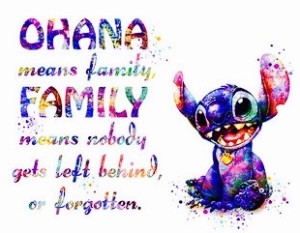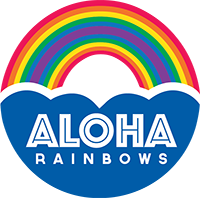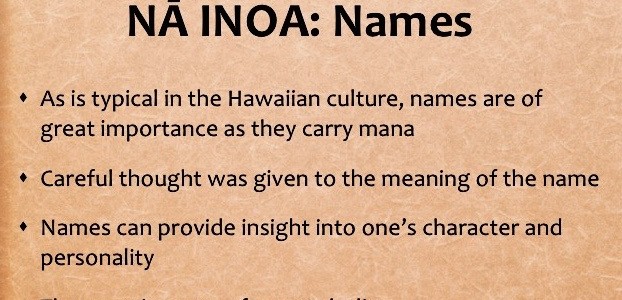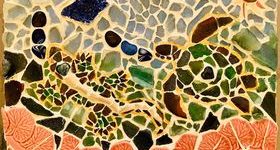I have been gifted two Hawaiian inoa (names). As with all Hawaiian names there is the ʻsurfaceʻ meaning and then the many layers of kaona (hidden meaning).
HaʻaoLakaināpali : Laka dances on the cliffs
This can be seen simply as Laka: Goddess of love, hula and forest plants, dances on the cliffs.
Namakanaokalani: one who brings the gifts from heaven(joyfully). This can be seen surface level simply as that.
Iʻm not going to go in to the multitude of kaona in each here. Suffice to say that having the kuleana of the kiakahi (purpose) and huakaʻi (journey) of both together is not for the faint hearted, I can assure you 😳
Utilising Hawaiian words and being given an Hawaiian name comes with a very deep kuleana (responsibility). It must be embodied. There is no wiggle room on that. It is an honour and a privilege.
Again, if you think living that name part–time is do-able, be prepared again for that whack with the pono paddle.
Be prepared to hele ka ʻolelo: walk the talk and embody the many layers of meaning and responsibility that go with that full time, or be prepared for any pono-up learning opportunities that will come your way.
“Ask permission and give thanks”
is Hawaiian protocol extended to all aspects of living and nature.
Letʻs look at two words that are often used by non-Hawaiians for business purposes. ALOHA and ʻOHANA
ALOHA: as most will know can mean hello, goodbye and love. However there are many deeper layers such as ALO~ the presence of spirit + HA ~ the breath of life. Aloha is greeting & acknowledging the spirit & the life of who/what you are addressing. I recognize you as life spirit. The joyful (oha) sharing (alo) of life energy (ha) in the present (alo) 
When one says ALOHA to another, it must be said sincerely.
To speak it with indifference or flippantly is inappropriate and profoundly disrespectful.
Aloha is more than a word, it is a way of life.
It is a concept that is profound and distinguishes the Hawaiian culture.
 Many will be familiar with the phrase from ʻLilo and Stitchʻ- ‘Ohana means family. Family means nobody gets left behind or forgotten.ʻ
Many will be familiar with the phrase from ʻLilo and Stitchʻ- ‘Ohana means family. Family means nobody gets left behind or forgotten.ʻ
‘OHANA: Literally means family, one’s blood relatives or kin, however commonly understood in a much wider sense, to include, friends, colleagues, classmates etc. It literally means “all from the shoots”. Deeper understanding comes from ’oha from the sacred Kalo (taro) plant, ‘Oha means the shoots growing form the corm of the kalo plant and it signifies that all ‘ohana come from the same root. No matter how distantly ancient Hawaiians were related, they recognized that they all came from the same root and therefore were all part of the same family.
A Basic foundation principle is that of INCLUSION.
As a practitioner and teacher of Hawaiian healing, spiritual and cultural practices I provide many opportunities of Aloha for ʻOhana
If someone wants to pick up a paddle and step into the waʻa of my teachings, I must include them. It is not aloha nor pono to refuse.
Being a Kumu is a tricky path to navigate at times. People in group saying ʻthey shouldnʻt be allowed here” “you should kick them outʻ mea mea mea (blah blah blah)
Trust me, if I had a dollar for every deep HA breath Iʻve taken over the years when haumana have brought their personal pilikia to groups, I would be a multi-millionaire. The thing is, itʻs always such a gift for others to look within at their own stuff and why their buttons are being pressed. However, it often results in a complete tossing out the door of all the ALOHA and PONO spiritual and healing practices they have learnt, and spiraling in to their own pilikia sludge. More deep HA breaths and ahonui from Kumu and Alakaʻi.
When you hele ka ʻolelo and work with the ancestors all the time, you donʻt get to make that mental judgement or call.
There is a ʻhoweverʻ. When someone who I ʻknowʻ & my naʻau tells me would not be an aloha contribution to a group, yet expresses interest, what do I do? I explain about a Lomilomi Training or Cultural Immersion Retreat and what is expected of all participants. I then hand it up to Spirit to take care of. I Ka Pono Mea : everything is in perfection, in excellence. People then come to their own place of attending or not.
People will show up for many reasons. Sometimes the learning is for them, sometimes for others in the group and sometimes for the teacher to see if they will waiver from what they know to be aloha and pono.
If you make choices and decisions based on judgements or personal agenda, you WILL get a big learning opportunity along with a firm whack from the pono paddle.
If opportunities of inclusion are presented and not actioned, the opportunities may no longer be presented or be available.
If someone takes actions that are not pono, but are instead Hala, Hewa, Ino and Pilikia, then the opportunities will not be made available until hoʻoponopono and hoʻopono pono ke ala are actioned.
Many years ago I was contacted excitedly by an haumana who had changed her email address to Pele : pele@something.com.au 😳 I took a couple of deep Ha breaths before suggesting that she re-think that. She wasnʻt ʻhearingʻ me explain why that was not pono so I had to step into firm aloha and explain the potential consequences and learning opportunities that would be afforded her by using that name and email address. She finally ʻheardʻ and changed the name.
There is deep kuleana when we utilise Hawaiian words in names, business names, email addresses, Facebook Pages, Instagram and other social media.
Be prepared to hele ka ʻolelo: walk the talk and embody the many layers of meaning and responsibility that go with that, or be prepared for any pono-up learning opportunities that will come your way.
LIVE ALOHA and PONO.
In EVERY moment.
SO, Mālama pono : take care of/nurture the pono. Mālama means to take care of, care for, protect, beware, preserve, maintain, support, and serve.
Pono means righteous(ly), upright(ly), proper(ly), good/well, excellent(ly), correct(ly), careful(ly), moral(ly), just(ly), fair(ly), honest(ly),
This quote from Edward Kanahele in the book ‘Ancient Sites of Molokai, Maui & Lana’iʻ, for me articulates profoundly the kuleana of embodying the Hawaiian words we utilise and the inoa we are gifted. :
“One of the ho’okupu (gift, offering) of highest value in the native Hawaiian culture is not an offering of fruit or vegetable or foliage; neither is it an offering of a fish( or a stone wrapped in a ti leaf) or a whale’s tooth or a family heirloom ; rather it’s ones word! One’s commitment! One’s promise! One’s sincere oath to pay deference to & uphold the physical & spiritual values of the culture!
One’s word is the ho’okupu of choice!”


